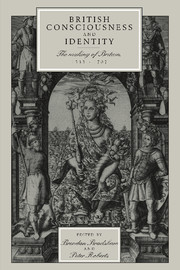Book contents
- Frontmatter
- Contents
- Notes on the contributors
- Preface
- Introduction
- 1 Tudor Wales, national identity and the British inheritance
- 2 The English Reformation and identity formation in Ireland and Wales
- 3 Faith, culture and sovereignty: Irish nationality and its development, 1558–1625
- 4 From English to British literature: John Lyly's Euphues and Edmund Spenser's The Faerie Queen
- 5 The British problem in three tracts on Ireland by Spenser, Bacon and Milton
- 6 James Ussher and the creation of an Irish protestant identity
- 7 Seventeenth-century Wales: definition and identity
- 8 Scottish identity in the seventeenth century
- 9 The Gaidhealtachd and the emergence of the Scottish Highlands
- 10 ‘No remedy more proper’: Anglo-Irish unionism before 1707
- 11 Protestantism, constitutionalism and British identity under the later Stuarts
- Index
Introduction
Published online by Cambridge University Press: 15 March 2010
- Frontmatter
- Contents
- Notes on the contributors
- Preface
- Introduction
- 1 Tudor Wales, national identity and the British inheritance
- 2 The English Reformation and identity formation in Ireland and Wales
- 3 Faith, culture and sovereignty: Irish nationality and its development, 1558–1625
- 4 From English to British literature: John Lyly's Euphues and Edmund Spenser's The Faerie Queen
- 5 The British problem in three tracts on Ireland by Spenser, Bacon and Milton
- 6 James Ussher and the creation of an Irish protestant identity
- 7 Seventeenth-century Wales: definition and identity
- 8 Scottish identity in the seventeenth century
- 9 The Gaidhealtachd and the emergence of the Scottish Highlands
- 10 ‘No remedy more proper’: Anglo-Irish unionism before 1707
- 11 Protestantism, constitutionalism and British identity under the later Stuarts
- Index
Summary
British history as a ‘new subject’ may be said to have been launched by John Pocock in a series of path-breaking studies charting the conceptual contours that define its unique territory which appeared over the two decades from 1974. So far as concerns the chronological span to which the present volume is devoted, the early modern period, the subject was ‘brought down to earth’, to adopt the phrase of Rees Davies, the distinguished practitioner of the genre for an earlier period, in the mid nineteen nineties. In the last few years a series of studies has appeared in print firmly grounded in documentary sources which explore the possibility of a political history of the Atlantic Archipelago as a coherent entity, not just as the sum of its national constituents, much less as a history of England with occasional glances towards the Celtic fringes as they intruded themselves into domestic politics. The agenda which emerged from these pioneering explorations largely relates to the implications of political developments on the two islands over the period for an emergent British state. One item they address is the extent to which the constitutional unions between England and Scotland in 1707, and between the United Kingdom thus constituted and Ireland in 1800, were pre-conditioned by moves towards greater integration between the relevant polities in the sixteenth and seventeenth centuries.
- Type
- Chapter
- Information
- British Consciousness and IdentityThe Making of Britain, 1533–1707, pp. 1 - 7Publisher: Cambridge University PressPrint publication year: 1998



